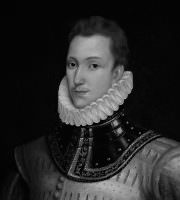About Philip Sidney
Philip Sidney (30 November 1554, Penshurst - 17 October 1586, Zutphen) was a British poet, soldier and courtier. He was one of the most important figures of the Elizabethan age, famous, among other things, for having written the collection of sonnets and songs Astrophil and Stella. His contribution to literature was very important, as he was among the most lively intellectuals of his time. Edmund Spenser dedicated The Shepheardes Calender to him.Nicknamed The Most Accomplished Gentleman in England by his contemporaries, he was the nephew of Robert Dudley, Earl of Leicester, favorite of Queen Elizabeth. He studied at Oxford and Cambridge and at Gray's Inn in London and then traveled the European continent for three years, where he made contacts with important Protestant circles and u. a. witnessed St. Bartholomew's Day in Paris, when thousands of Huguenots were murdered and the English Protestants, under his leadership, holed up in the English embassy. Returning in 1575, he first won the favor of Queen Elizabeth I of England, without being able to benefit significantly from this in terms of his career at court. Sidney married the daughter of Sir Francis Walsingham, Secretary of State and influential head of Intelligence to Elizabeth I, but retired in 1578 to Wilton House in Wiltshire, the country home of his brother-in-law, Henry Herbert, 2nd Earl of Pembroke, where he held a number of Sonnets in the sought-after style of the age, following the Concetti of the Italians, and wrote the pastoral novel Arcadia. But although Sidney has decidedly Spanish and Italian models in mind, he is not satisfied with descriptions of pastoral life; he also intertwines scenes of knightly and hunting life with those and knows how to execute them with the same liveliness and grace. His Apology for poetry (1595) attempts to show that the pleasures of poetry are powerful promoters not only in the acquisition of knowledge but also in the cultivation of virtue.
He died in the Netherlands, following the Battle of Zutphen, a member of an English expeditionary force sent to support the Dutch insurgents of the United Provinces against the King of Spain Philip II. As he was dying, he sent a letter to the Jülisch-Klevischen personal physician Johann Weyer in Wesel asking for help[3][4]. Sidney died on 17/27. October 1586 and buried in the old St Paul's Cathedral in London.
Browse all poems and texts published on Philip Sidney









